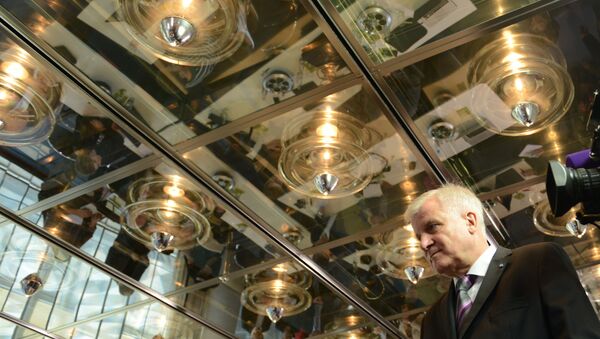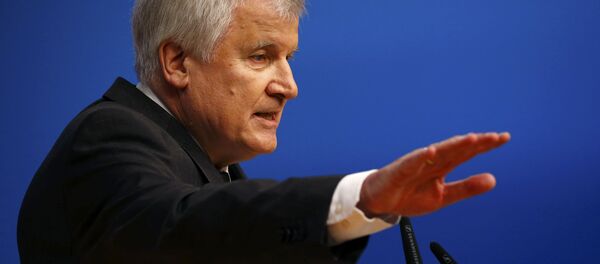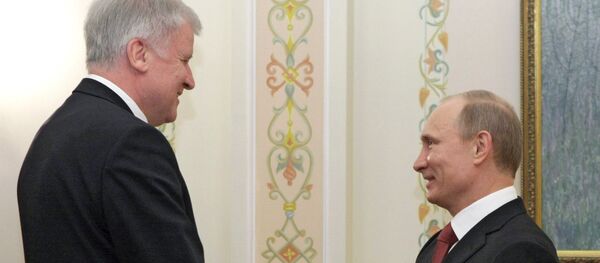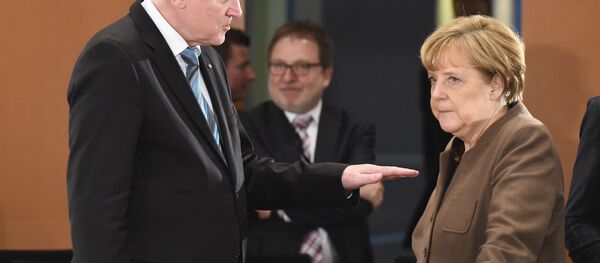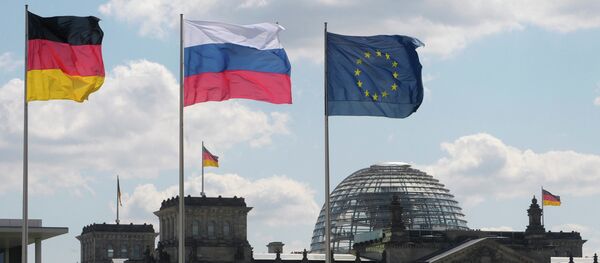On February 4, Bavarian Prime Minister and Christian Social Union in Bavaria (CSU) Chairman Horst Seehofer will arrive in Moscow. In the course of his visit, he will meet for talks with President Putin, Economic Development Minister Alexei Ulyukaev and Minister of Trade and Industry Denis Manturov.
In Germany, Seehofer is known for his consistent criticism of Chancellor Angela Merkel on several issues, despite the fact that the Bavarian CSU is the sister party of Merkel's federal party – the Christian Democratic Union (CDU). The politician is critical of the federal government's position on Syria, the migrant crisis and relations with Russia. Specifically, he is calling for the softening of anti-Russian sanctions.
Commenting on the implications of the visit, and the true significance of the Bavarian official's scuffles with federal politicians, Vladislav Belov, the head of the Center for German Studies at the Russian Academy of Sciences' Institute of Europe, told Russia's Svobodnaya Pressa newspaper that the visit is simply an indication of German pragmatism.
"It's worth remembering that that Horst Seehofer is not only the Bavarian prime minister and the Chairman of the Christian Social Union, but a member of the ruling coalition which formed following the elections of 2013. There's such a thing as the CDU/SCU union, and Seehofer is the leader of one of the parties forming the German government. Therefore, Seehofer's visit is not just a visit by a Bavarian politician, but a visit from a representative of the coalition government, and should be seen as such."
At the same time, the analyst noted, Bavaria "has always had its own point of view – it's called the 'Free State of Bavaria' after all. It has its own traditions, its own position. Bavaria not only criticizes Chancellor Merkel, but is also looking for independent solutions to problems."
One of the largest problems facing the state at the moment, and arguably Seehofer's biggest area of disagreement with the federal government, is not Russia, but the refugee crisis. Here, Belov notes, "Bavaria has its own interpretation of the laws concerning refugees, and by law can restrict the flow of migrants and introduce border controls."
Furthermore, "Bavaria is one of the locomotives of the German economy. It is there that large companies such as BMW and Siemens are based. They are interested in the easing of sanctions in relation to Russia. As a representative of Bavarian business, Seehofer is naturally in favor of milder sanctions."
For its part, the analyst notes, "Moscow will probably try to use Seehofer's position to discuss the problems that exist in relations with Germany as a whole. Political contacts at the highest level between our two countries are frozen, and not on the initiative of Berlin, but that of Brussels. Nonetheless, working contacts remain, and have never stopped. Meetings between ministers continue."
"This," Belov suggests, "is the context in which Seehofer's visit must be seen, instead of presenting it as some sort of scandal. This is just a continuation of a working dialogue, which never stopped, despite sanctions and Berlin's rigid position."
For his part, Alexander Kokeyev, senior researcher at the Moscow-based Institute of World Economy and International Relations' Department of European Political Studies, is similarly restrained over the significance of Seehofer's visit.
"Firstly, I would not call Seehofer a 'pro-Russian' politician. If we did that, we could call the German government, Merkel, and especially German Foreign Minister Frank-Walter Steinmeier 'pro-Russian'. The truth is simply that relations with Russia are very important for Germany, and therefore they will develop whatever happens, under certain conditions, of course."
"On the other hand, Seehofer really has become a very tough critic of the German government, but not because of anti-Russian sanctions, but due to the issue of migrants. He stands firm in his opposition, and to emphasize it, has decided to visit Russia – but this is not the main reason for his visit."
Ultimately, Kokeyev explains, politically speaking, the Bavarian PM's decision to come to Moscow is not unlike the decisions made by other politicians, such as SPD leader Sigmar Gabriel, who visited Russia last October. "Germany is home to a heated debate on domestic policy, and it is partially displayed through politicians' actions outside the country."
Still, it's not worth playing up the idea of internal divisions on foreign policy. "All of Germany's political forces have a similar line on the development of relations with Russia, and it would be unrealistic to expect that someone could change that line –to break the West's position on Russia. This is not the case."
The truth, the analyst suggests, is that not only Seehofer, but the German government as a whole has reason to hope for improving relations with Russia. "Among the European countries, Germany has the strongest relationship with Russia. Berlin is interested in the development of relations for economic, political and geographic reasons. Germany remains our main partner in the EU, and Berlin would like to see everything return to the [pre-2014] level."
In the final analysis, the analyst says, "searching for some pro-Russian German politicians is a thankless business. There are, however, serious political issues which are being addressed pragmatically…I do not think that Seehofer's visit will serve as some sort of breakthrough. It's just a continuation of dialogue."

